Margaret Noodin
Gimaazinibii’amoon (A Message to You)
A special bilingual poem in Anishinaabemowin and English by Margaret Noodin, a linguist who writes primarily in Anishinaabemowin. This poem of eight lines is filled with location — the sweet sea, the curved shoreline — and gathers melancholy into its song. And it is a song — sung in both languages for us by Margaret Noodin herself.
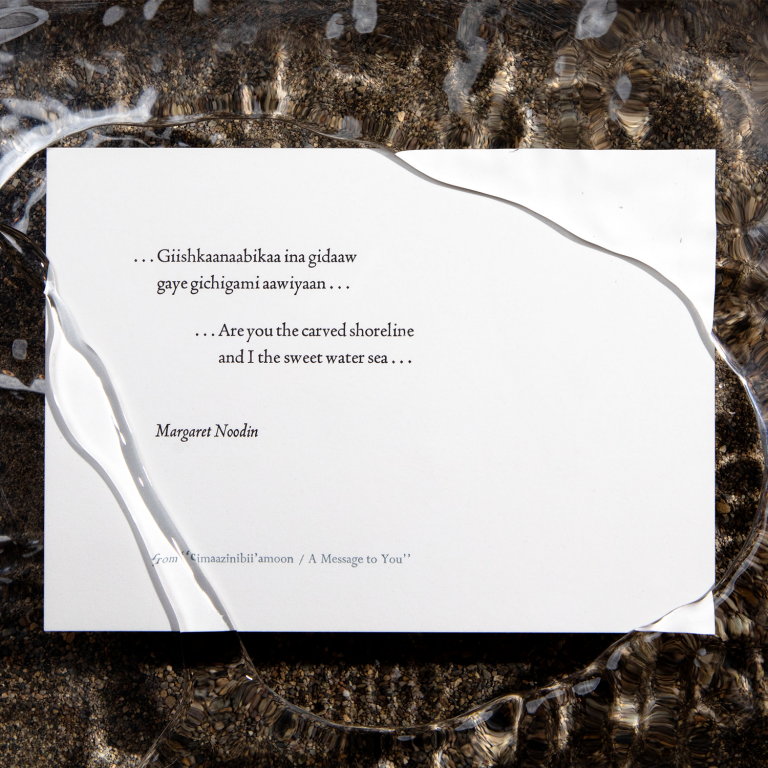
Letterpress prints by Myrna Keliher | Photography by Lucero Torres © All Rights Reserved.
Guest
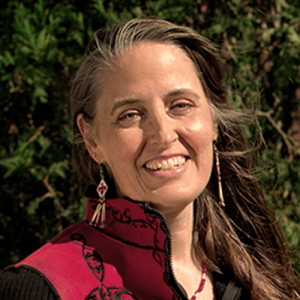
Margaret Noodin is a poet and the author of Bawaajimo: A Dialect of Dreams in Anishinaabe Language and Literature, Weweni: Poems in Anishinaabemowin and English, and What the Chickadee Knows. She teaches American Indian Literature, Celtic Literature, Indigenous Language Revitalization and Anishinaabemowin language at University of Wisconsin Milwaukee. Margaret is the editor of ojibwe.net and the Papers of the Algonquian Conference.
Transcript
Pádraig Ó Tuama: My name is Pádraig Ó Tuama, and when I go through a difficult time, where a meeting goes in a difficult way or I just have woken up on the wrong side of the bed, I try to write from that feeling. I put it into a poem. And rarely do those poems ever get shared with anyone, but there’s such a helpful thing in seeing what I’m feeling, on a page, that helps me feel seen, and also then helps me perhaps move beyond or through the experience that I’m living with.
[music: “Praise the Rain” by Gautam Srikishan]
Our poem today comes from Margaret Noodin, a poet who writes in Anishinaabemowin. And the poem that she has written is called “Gimaazinibii’amoon,” which translates as “A Message to You.” We have her voice bringing this poem to us, today, in the original language, Anishinaabemowin, as well as in the translation.
Margaret Noodin: “Gimaazinibii’amoon”:
“Ningikendaan akiin bakaanag
onzaam gaa nindaanikoobijiganinaanig
mazinibii’amawaawaad
onzaam wiijiwag wanishinowaad daawaad noongom
onzaam gii-izhi’iyan zhigo.
Giishkaanaabikaa ina gidaaw
gaye gichigami aawiyaan
gemaa washkiyaanimaazoyaan
gaawiin gikenimisiiyan?”
“A Message to You”:
“I know there are different worlds
because our ancestors sent them messages
because lost lovers now live in them
because you just said that right now.
Are you the carved shoreline
and I the sweet water sea
or am I the shifting wind
you cannot perceive?”
[music: “Ashed to Air” by Gautam Srikishan]
Ó Tuama: I was really drawn to this book by Margaret Noodin, What the Chickadee Knows, because there’s about ten chickadees who live in my backyard. I feed them every day and then watch their antics and watch their acrobatics and watch them weave in and out between larger birds, as they pick up seeds and then take those seeds off into the bushes where they store or stash before eating them or sharing them. And so I see these little birds every day — small, cheeky, funny — so present, so filled with energy, so alert, and so acrobatic in their dexterity. So I was thrilled to find this book by her and thought, oh, I’d love to find a poem about the particular bird.
But then, when I read through the book, I kept on coming back to this one particular poem, “A Message to You.” And I think I was mostly intrigued, thinking, who is the “you”? Who is this speaking to? Is it just one person? Is it someone she misses? Is it someone where there was a difficult relationship? There seems to be a gap between them. And even in the ways wherein voices and spirits speak to each other across worlds, still this poem recognizes there can be a missing, and a gap happening. And I couldn’t stop thinking about this poem the whole way throughout the book. So this is the one that really struck me for this episode.
[music: “At Dusk” by Gautam Srikishan]
This poem leaves so much unsaid. It’s called “A Message to You,” and the fourth line, “because you just said that right now” — I can think of that, perhaps, being a child who has said something, and maybe they remind you of a dead parent. Or it could be a stranger has said something, and they remind you of somebody that you miss, or an old lover; or maybe even they remind you of somebody who you don’t miss, but nonetheless, their voice of criticism, their voice of angst, their voice of difficulty comes through in a living moment. We don’t know, in this poem, who the “you” is and what the “that” is.
And then the poem begins to question who the you is: “Are you the carved shoreline / and I the sweet water sea / or am I the shifting wind you cannot perceive?” There’s a distance between the you and the I, in this poem, and yet the poem is making a bridge between the present experience and the different worlds that are there. Perhaps this is a way of describing cultures that overlap cultures — some cultures that are dominant, and other cultures that are struggling to survive; some languages that are asserting themselves in a dominant way, and languages that are seeking to live into their own vivacity and to find a way to live well again and to be spoken regularly and widely again.
I always find myself feeling like this is an airy poem. It’s only eight lines long, and there’s so much space on the page. And when Margaret Noodin recites it, she sings it. And so we’re brought into something that has an old melody, and we’re caught up in that — a wistful melody, a melody that sticks in your ear, that sticks in your heart, afterwards. And over and over again, I find myself wondering, who is the you, and what have they said? And who is the I, and what are they feeling?
[music: “At Dusk” by Gautam Srikishan]
When Margaret Noodin speaks about the chickadee, she speaks about it as a bird that doesn’t leave for the winter. And so the chickadee is a certain symbol of staying around, of not leaving, of being able to live in the location throughout all the seasons that come. And that, I think, can be a metaphor for language, can be a metaphor for survival — and not just languages spoken by everybody, but particularly Anishinaabemowin language, a language that has stayed even though it has been put through harsh, harsh climates of degradation and systemic injustice. And this language, I think, is sometimes represented in Margaret Noodin’s book being like the chickadee — the one that stays; the one that doesn’t go, but that can survive even harsh winters.
[music: “At Dusk” by Gautam Srikishan]
The chickadee in this book is a way of speaking about staying. And then this particular poem, “A Message to You,” is a way about speaking to the things that stay around — a lost lover, an ancestor, a difficult relationship, even. We continue these conversations, and those conversations happen in landscape, for us. While we’re looking out at the sweet water sea or looking at the shoreline, we are continuing on an inner conversation to talk with people who aren’t there anymore. But they stay with us because, somehow, it’s got its hooks in us, for better or for worse. And this, I think, is a way of thinking about the messages we’re sending all the time, in the inner conversations we’re having, because somebody says something to us — something beautiful, something difficult — and it sparks off all kinds of replies in us. And these replies are caught up in this “Message to You.”
[music: “Memoriam” by Gautam Srikishan]
The last two lines, “[…] am I the shifting wind / you cannot perceive?” — it was those two lines made me think, this isn’t necessarily to a lover or to a family member, where she’s thinking, oh, I wish we were back together. She’s kind of saying, “You can’t perceive me. Am I the shifting wind?” Somehow, this isn’t about one person being alive and one person being dead. This is about how difficult it can be to connect with each other, the things we can say to each other that indicate, “You don’t even see me. Am I invisible to you? Am I uninteresting to you? Are the circumstances of my life unimportant to you, that I’m like a shifting wind you can’t perceive and, therefore, you ignore?”
And within the context of that, I think this poem is reaching out for fortitude, [laughs] reaching out in the hope that there are groups of people that can see you, because sometimes, when you feel like you’re not being seen, you’re thinking, somebody else did see me, once, and even though that’s not enough, finally, it’s enough for right now.
[music: “Memoriam” by Gautam Srikishan]
Margaret Noodin tells a story about where this poem came from. And the full story is hers to share, and we’ve got a bit of a snippet of a conversation that Margaret Noodin and I had coming out as a bonus episode of Poetry Unbound, alongside this episode. But one of the interesting things that she says, amongst the many interesting things she says, is that this poem arose out of a difficult work meeting. And the poem is so transcendent — different worlds, ancestors, lost lovers, carved shoreline, sweet water sea, shifting wind. I don’t think in those kind of images, after I’ve been in a work meeting, especially a difficult work meeting, and it is fascinating to hear how somebody has brought images that bring them consolation and images that root them in a language that has been around in a particular place for thousands and thousands and thousands of years. It’s so interesting how fortitude is taken from language and place, in the midst of such a fleeting but nonetheless difficult thing, like a troublesome work meeting.
But this poem has a great wisdom to it, in the sense of that there are messages coming to us and coming from us over and over again, throughout our days. And the question that I think this poem is asking is, who is it that you talk to? Even though you mightn’t see them, maybe their words got into you, in a loving way, or they got under your skin. Maybe it’s a lover or a friend or a family member, or somebody you were glad is gone from your life, or sad who’s gone from your life. And what are the messages they’re sending to you now, and what are the messages that you’re sending back to them? What’s the conversation that you’re keeping alive because you’re holding it in you? And where are the places, particularly, where you have those conversations?
And I think the poem is inviting us to pay attention to the tenderness of the words that are there and, also, to allow the mystery of the fact that we are sometimes unknowable to ourselves and to each other; to exist in the way that we continue to live with messages and communications that go on, even after a person is gone from our life.
[music: “Ashed to Air” by Gautam Srikishan]
This is “Gimaazinibii’amoon (A Message to You),” written and recited in Anishinaabemowin and English by Margaret Noodin.
Noodin: “Gimaazinibii’amoon”:
“Ningikendaan akiin bakaanag
onzaam gaa nindaanikoobijiganinaanig
mazinibii’amawaawaad
onzaam wiijiwag wanishinowaad daawaad noongom
onzaam gii-izhi’iyan zhigo.
Giishkaanaabikaa ina gidaaw
gaye gichigami aawiyaan
gemaa washkiyaanimaazoyaan
gaawiin gikenimisiiyan?”
“A Message to You”:
“I know there are different worlds
because our ancestors sent them messages
because lost lovers now live in them
because you just said that right now.
Are you the carved shoreline
and I the sweet water sea
or am I the shifting wind
you cannot perceive?”
[music: “Praise the Rain” by Gautam Srikishan]
Lily Percy: “Gimaazinibii’amoon (A Message to You)” comes from Margaret Noodin’s book What the Chickadee Knows. Thank you to Wayne State University Press, who gave us permission to use Margaret’s poem, and to Margaret, for her beautiful singing. Read the poem on our website, at onbeing.org.
[music: “Praise the Rain” by Gautam Srikishan]
Poetry Unbound is: Gautam Srikishan, Chris Heagle, Erin Colasacco, Eddie Gonzalez, Lilian Vo, and me, Lily Percy.
Our music is composed and provided by Gautam Srikishan and Blue Dot Sessions. This podcast is produced by On Being Studios, which is located on Dakota land.
We also produce other podcasts you might enjoy, like On Being with Krista Tippett, Becoming Wise, and This Movie Changed Me. Find those wherever you like to listen, or visit us at onbeing.org to find out more.
Books & Music
Recommended Reading
The On Being Project is an affiliate partner of Bookshop.org and Amazon.com. Any earnings we receive through these affiliate partnerships go into directly supporting The On Being Project.






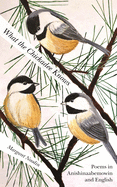
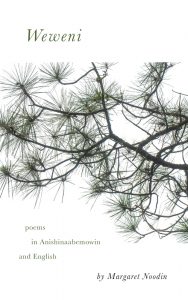
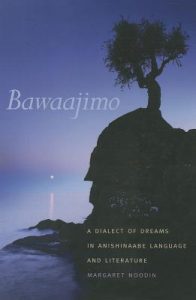

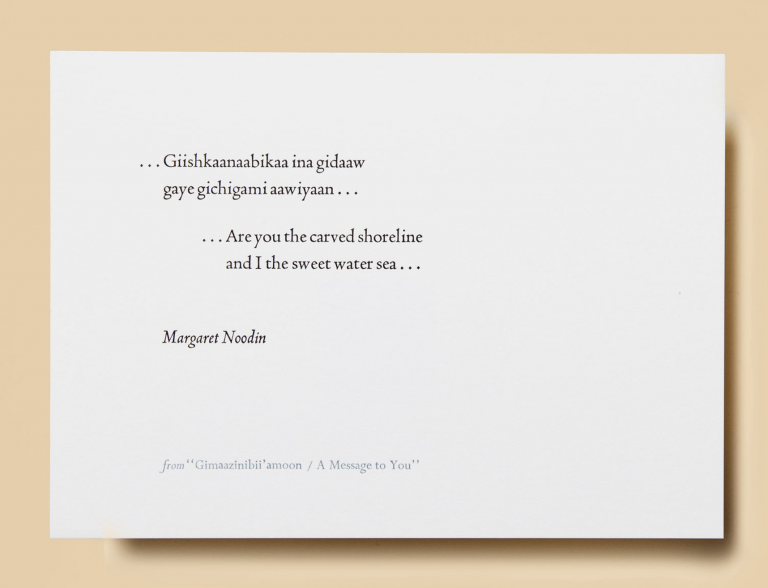
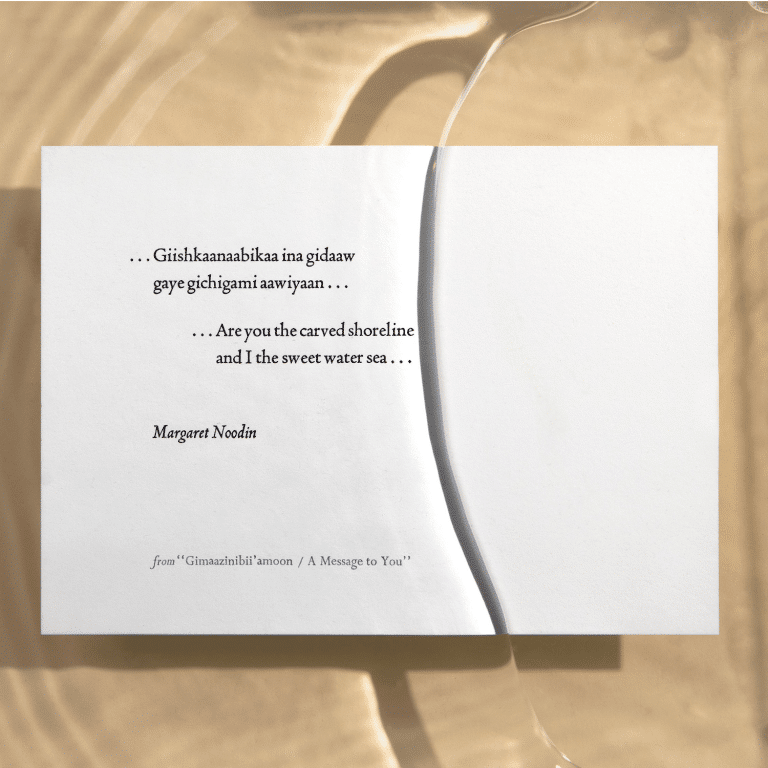
Reflections